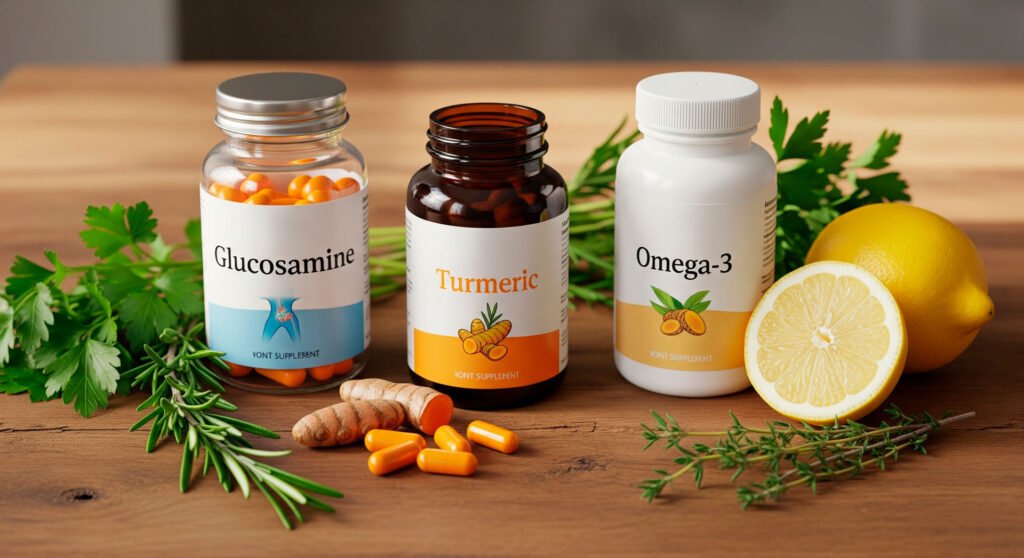Page Contents
ToggleDo you find yourself wincing when you climb stairs or hesitating before your morning jog? If you’re between 30 and 60, you’re not alone in worrying about your joints. The good news is that this comprehensive joint health guide will show you proven, natural strategies to keep moving comfortably for years to come. Whether you’re dealing with occasional stiffness or want to prevent future problems, understanding how to care for your joints naturally can make all the difference in maintaining an active, fulfilling lifestyle.
Understanding Your Joint Health Guide Basics
Your joints are remarkable structures where two or more bones meet, allowing movement while providing stability. They consist of cartilage (the smooth cushioning material), synovial fluid (nature’s lubricant), ligaments, and surrounding muscles. Think of them as sophisticated hinges that need regular maintenance to function smoothly.
As we age, several factors affect joint health. Cartilage naturally wears down, synovial fluid decreases, and supporting muscles may weaken. Add in factors like weight gain, repetitive movements from work or hobbies, and previous injuries, and it’s clear why joint care becomes increasingly important after 30. The key is taking proactive steps now rather than waiting for problems to develop.
If you’re starting to notice early stiffness or want to be proactive, our Joint Genesis Review 2025 explores a natural supplement designed to protect cartilage and maintain mobility as you age.
Natural Supplements for Joint Support
Research shows that certain natural supplements can significantly support joint health. Glucosamine and chondroitin, found naturally in cartilage, have been extensively studied for their ability to reduce pain and improve function. Many people report noticeable improvements after 8-12 weeks of consistent use.
Other beneficial supplements include:
- Omega-3 fatty acids (reduce inflammation)
- Turmeric/curcumin (powerful anti-inflammatory)
- MSM (supports connective tissue)
- Collagen peptides (rebuilds cartilage)
- Boswellia (reduces joint swelling)

Quality matters when choosing supplements. Look for third-party tested products with standardized active ingredients. While these natural options work more gradually than pain medications, they support long-term joint health without harsh side effects.
Collagen and hyaluronic acid are two star ingredients in modern joint supplements. Our Joint Genesis Review 2025 shows how combining these compounds with natural anti-inflammatory botanicals can further enhance flexibility and comfort.
Exercise Tips for Healthy Joints
Movement is medicine for your joints, but the right kind of movement makes all the difference. Low-impact exercise tips focus on strengthening muscles around joints while minimizing stress on cartilage. Swimming, water aerobics, and cycling provide excellent cardiovascular benefits without pounding your joints.

Strength training deserves special attention. Building muscle around joints creates natural support and stability. Focus on:
- Bodyweight exercises like wall sits and modified planks
- Resistance band workouts for controlled movements
- Light weights with higher repetitions
- Proper form over heavy loads
Remember to warm up thoroughly and cool down properly. A 5-10 minute gentle warm-up increases synovial fluid production, literally oiling your joints for smoother movement.
For those who need extra support to stay active, supplements like the one in our Joint Genesis Review 2025 may help reduce stiffness, making it easier to maintain an active lifestyle.
Anti-Inflammatory Diet Choices
What you eat directly impacts joint health through inflammation levels. An anti-inflammatory diet rich in whole foods can reduce joint pain and stiffness naturally. Mediterranean-style eating patterns show particularly strong benefits for joint health.
Focus on incorporating:
- Fatty fish (salmon, mackerel, sardines) twice weekly
- Colorful vegetables and fruits (especially berries)
- Nuts and seeds (walnuts, flaxseeds)
- Olive oil as primary cooking fat
- Green tea instead of sugary drinks
Equally important is limiting foods that promote inflammation: processed meats, refined sugars, excessive omega-6 oils, and highly processed snacks. Many people notice reduced morning stiffness within weeks of dietary changes.

To see how these ingredients work together in practice, check out our Joint Genesis Review 2025, where we break down the formula and real user experiences.
Lifestyle Changes That Make a Difference
Small lifestyle changes can have profound effects on joint health. Maintaining a healthy weight reduces stress on weight-bearing joints – every pound lost removes four pounds of pressure from your knees. If you work at a desk, set hourly reminders to stand and stretch.
Sleep quality also affects joint health. During deep sleep, your body repairs tissues and reduces inflammation. Aim for 7-9 hours nightly, using supportive pillows to maintain proper alignment. Consider a medium-firm mattress that supports natural spine curves without creating pressure points.
Stress management plays a surprising role too. Chronic stress increases inflammation throughout your body, including joints. Regular meditation, yoga, or simple breathing exercises can help manage both stress and joint discomfort.
Prevention Strategies for Long-Term Health
The best prevention strategies start early and remain consistent. Regular check-ups help catch problems before they become serious. Pay attention to your body’s signals – persistent joint pain lasting more than a few days warrants professional evaluation.

Protect your joints during daily activities:
- Use proper lifting techniques (bend knees, not back)
- Wear supportive shoes with good cushioning
- Take breaks during repetitive tasks
- Use ergonomic tools and furniture
- Stay hydrated for optimal synovial fluid production
Consider working with a physical therapist to identify and correct movement patterns that stress your joints. They can teach specific exercises targeting your vulnerable areas.
When to Seek Professional Help
While natural approaches work well for many joint issues, knowing when to seek professional help is crucial. Warning signs include:
- Joint pain lasting more than two weeks
- Swelling that doesn’t respond to rest and ice
- Joint instability or giving way
- Significant morning stiffness lasting over an hour
- Pain that disrupts sleep or daily activities
Don’t wait until problems become severe. Early intervention often prevents minor issues from becoming major limitations.
Your joints have carried you this far, and with proper care, they’ll continue supporting your active lifestyle for decades to come. This joint health guide provides a roadmap, but remember that consistency matters more than perfection. Start with one or two changes that feel manageable, then gradually build your joint-healthy habits. Whether it’s adding omega-3s to your diet, starting a swimming routine, or simply taking stretch breaks at work, every positive step counts. Your future self will thank you for the investment in joint health you make today.
Sources
This article was inspired by and adapted to better serve the readers of Best Natural Health Products from “Joint Health: A Complete Guide to Lifelong Mobility”. Baylor Scott & White Health. Available at: https://www.bswhealth.com/blog/joint-health-a-complete-guide-to-lifelong-mobility. Accessed on: September 16, 2025.
Mark Henderson is the Lead Product Analyst and resident skeptic. He specializes in the "Dosage Audit," rigorously cross-referencing label claims against clinical trials to expose underdosed products. Mark helps readers bypass the hype to find longevity solutions with a proven ROI.
- Mark Henderson
